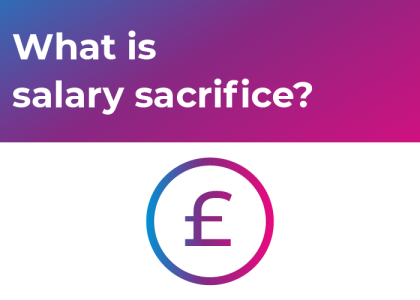Your workplace needs more WOW. Get ready for MHR's World of Work 2026

What is salary sacrifice?
There are a huge range of benefits you can offer your employees, but salary sacrifice is a powerful option that often goes overlooked.
The concept is pretty simple. You make an agreement to reduce their gross pay and give them a benefit in return. This might be a good (such as a car or bike) but it might also be a service (pensions, childcare, healthcare).
There are also several misconceptions around salary sacrifice. According to the Scottish Widows, over 34% of people believe that it results in lower take home pay. In addition, 12% of respondents said they thought only high earners can take part.
Salary sacrifice is something of a misnomer. No one actually has to sacrifice anything. While the employee might have less cash in hand, they can often end up with a higher take home pay due to the tax implications. Educating your employees is key to a successful salary sacrifice scheme.
How salary sacrifice works
Firstly, you need to figure out how much the benefits you’re offering are worth in terms of cash. Sometimes this will be relatively simple- pension contributions are fairly fixed based on percentages as an example. Other benefits might require more thought. From there you can offer the benefit to your employees. You should make sure to spell out what the cost will be to them and establish the complete terms of the agreement. Once you’ve done that, you can amend their contracts. The employee will then see a reduction in their salary in exchange for the benefit.
It’s important to note that all salary sacrifice schemes need to be optional, with every employee being able to opt in and opt out. As of 2019, workplace pension schemes are considered opt in by default. Employees have to actively choose not to partake. Your pension provider may have some educational materials to help employees understand why opting in is useful to them, so make sure to spread that around.
Benefits of salary sacrifice
It may seem counterintuitive, but salary sacrifice can often leader to higher take home pay, as they lower your national insurance contributions. This goes for the employer and the employee, and it’s a great reason to offer high pension contributions. Effectively, salary sacrifice offers up more tax efficiency. You receive less income but save money.
Salary sacrifice is also very appealing to employees because it enables them to take part in benefits that they might otherwise not be able to. This gives the employee the power to structure their compensation based on what works for them and their lifestyle. Different benefits might become more relevant based on someone’s life stage, and opting in and out of different salary sacrifice options is useful.
Employers also save money through these schemes as they help reduce their national insurance contributions and result in lower corporation taxes. Crucially, however, salary sacrifice is great for attracting top talent to your business.

Examples of salary sacrifice schemes
The classic example that most people think of when they think of salary sacrifice are pension contributions. Not all workplace pension schemes use salary sacrifice, but a sizeable number do. Employers need to contribute 3% of as a minimum, but offering slightly more can
Do note that each person can only contribute £60,000 annually (at time of writing) to their pension pot. This is because you can pay into your pension tax free, and there needs to be a limit on that.
Company car schemes are also a popular choice, but cycle to work schemes are becoming a more popular alternative due to costing less and having a better impact on the environment. The act of getting to and from work can be a huge cost for an employee. By providing them options (car schemes often also include insurance and maintenance fees). This has the additional benefit of helping encourage employees into the office, if that’s important to your company culture.
Other benefits can include childcare vouchers, mobile phones, gym memberships.
Considerations and potential disadvantages
The most important consideration for you as an employer is that salary sacrifice must not result in an employee falling below minimum wage. For example, there have been some employers using salary sacrifice to cover uniform costs. This led to many employees earning less than minimum wage, resulting in the employers being liable for large fines. You can put caps in place to ensure this never happens.
Employees who are on minimum wage shouldn’t be offered salary sacrifice schemes. That means you need to offer them something else to make up the difference. Every employee needs to be offered the same salary sacrifice schemes, or else you’ll be open to claims of discrimination. Likewise, all such schemes must be entirely voluntary.
There’s also the fact that salary sacrifice does impact an employee’s salary on paper. This can have implications when it comes to things like mortgage applications and credit checks, they will show up as earning less.
Salary sacrifice schemes need to be clearly written into an employee’s contract. That means that when there’s a change in their circumstances, such as marriage, divorce, pregnancy or adoption, they may want to adjust their participation. This can lead to additional administrative work if you don’t have a benefits management portal. You’ll need robust HR software and processes to make sure everything is updated when it needs to be, and to make sure people get paid on time every time.
Likewise, high staff turnover can lead to problems here. What happens if an employee who’s leasing a car through salary sacrifice leaves early, for example? Always consider if your organisation can bear the cost of your benefit schemes.
Final thoughts
The most important thing to take away from salary sacrifice as a concept is flexibility. By offering a range of options, your employees can build compensation packages that work for them, letting them take control of their finances.


